
I’m going to let you in on a secret…
… Entrepreneurs are not geniuses.
You might look at famous entrepreneurs and think “I could never have an idea like that.” You’re wrong. And that’s a good thing. The truth is that you do already have an idea for a viable business, you just don’t know it yet. In this guide, we’re going to explore what those ideas might be, and how you can uncover them.
We’re going to start with a simple premise — that you can create a good business idea from what you already know and love. We’re going to explore your skills and interests, and see if we can combine those into something interesting. It might not be a world shattering premise, or even something you decide to execute on, but that’s not the point. What it will do is teach you how thinking objectively about your approach and skills can get you into the habit of coming up with promising ideas and give you the confidence to do that, and keep doing it.
We’ll start with your own skills, talents, interests, and experience, because it’s something you already have a great deal of knowledge about. You don’t need to do any research to find out what you already know and like — what we’re going to do is combine these in interesting and unusual ways, to see if anything fascinating and business-worthy comes out.
I’ve designed this guide to be easy to use, but it’s up to you how you use it. Feel free to mix and match, jump around, and use it in a way that’s comfortable for you. Remember, it’s the way you think about and use this process, rather than the outcome that’s important.
By the time we’re done, you’ll be able to:
- Understand all your main skills and how you could use them in business.
- Create a list of the things you care about.
- Work out the interests and skills that are most important to you.
- Create shortlist of ideas you can explore further.
Let’s get into it…
We’re going to:
- Explore and list your key skills
- Explore and list your interests
- Prioritize the things that are most important to you
- Combine your skills and interests to create business ideas
- Explore next steps
Explore and List Your Key Skills
Grab a pen and some paper, and start writing down your key skills. What is a skill? Well, essentially it’s:
- Something you’ve learned to do or are naturally good at.
- Is something you can actively “do” or practice.
- Might have been learned in a formal setting.
- Gives you a capability to achieve something.
Explore the various areas of your life and work to find skills you’re good at. These don’t just need to be “hard” skills like computer programming or carpentry — they can include “soft” skills like parenting or being a good party planner.
Write down anything you think is relevant. This doesn’t have to be an exhaustive list, but you should aim for a fair number of skills. Try to get a good selection across work, academia, your personal life, your social life, and your hobbies.
Be precise in capturing your skills. Instead of saying “The Arts,” you might say ”Oil Painting” or instead of “Parenting” you might say “Child Development.”
Examples of Skill Areas
Here are some of the areas you can think about when you’re exploring your skills list.
- Qualifications and formal education — e.g. college or university studies, further education, formal tuition and academic training.
- Vocational skills — e.g. carpentry, mechanics, engineering, internships, apprenticeships, trade skills, construction, plumbing etc.
- Business and career skills — e.g. financial management, administration, HR, sales, operations, projects, marketing, management, leadership.
- Soft skills — e.g. social skills, pastimes, research, languages.
- Skills learned from hobbies and interests — e.g. creativity, sports, crafts, arts, playing an instrument.
- Life skills — e.g. child care, cooking, driving, home improvement.
You can expand on your list by:
- Looking at your CV, resume, or LinkedIn profile.
- Thinking about your employment history and the skills you needed.
- Reviewing your qualifications, certifications, and training.
- Seeing the skills you use every day.
- Talking to your friends about the skills they think you have.
The important thing is that by the end of this stage, you should have a good list of skills you’re confident in. Below, you can see an example of a skill list.
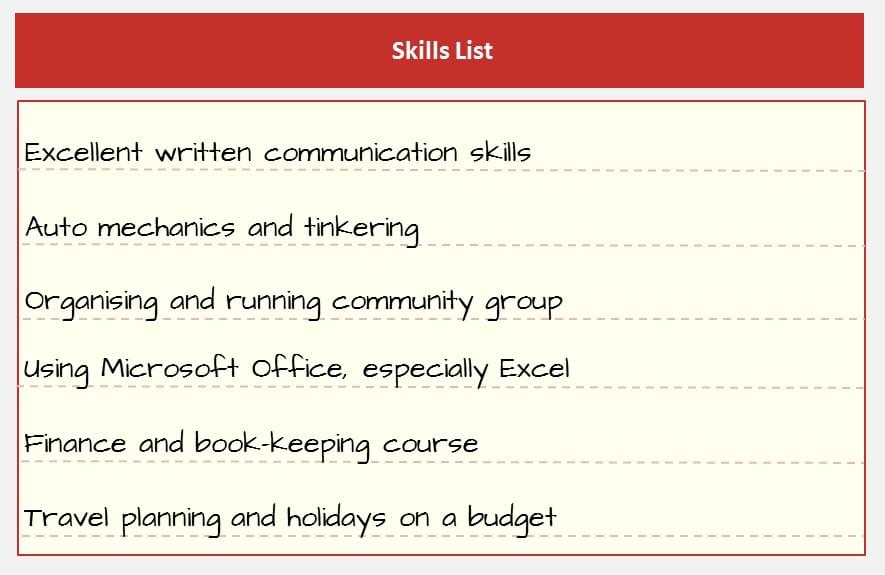
Explore and List Your Interests
Just like with your skills, we’re now going to think about and list your interests. What counts as an interest?
- It’s something you choose to do in your spare time, whatever that is.
- It’s a pastime, hobby, or a way to enjoy yourself.
- It’s something that excites, inspires, or entertains you.
- It’s something you care about.
Start thinking about and writing down your interests — you’ll want to put these in a different list to your skills. Explain your interests in the right amount of detail, and remember that sometimes your skills and interests might be the same. That’s fine, capture them in both lists.
Examples of Interest Areas
Here’s some inspiration for the types of areas you can think about:
- Business and work — e.g. budgeting, finance, investing, productivity.
- Entertainment — e.g. gaming, films, reading, drama, music, theatre.
- Technology — e.g. tablets, phones, computers, popular science.
- Home — e.g. model making, cooking, bread making, metalworking.
- Hobbies and pastimes — e.g. handicrafts, sports, fashion.
- Other — e.g. travel, pets, volunteering.
You can expand on your list by:
- Looking at Facebook and Meetup interest groups.
- Talking to your friends about shared interests.
- Keeping a quick diary of the things you do each day for a couple of weeks.
You might not be able to get all your skills and interests noted down in a day, that’s fine. You can revisit your lists once or several times until you’ve captured the stuff you think is important. Below, you can see an example of an interest list.
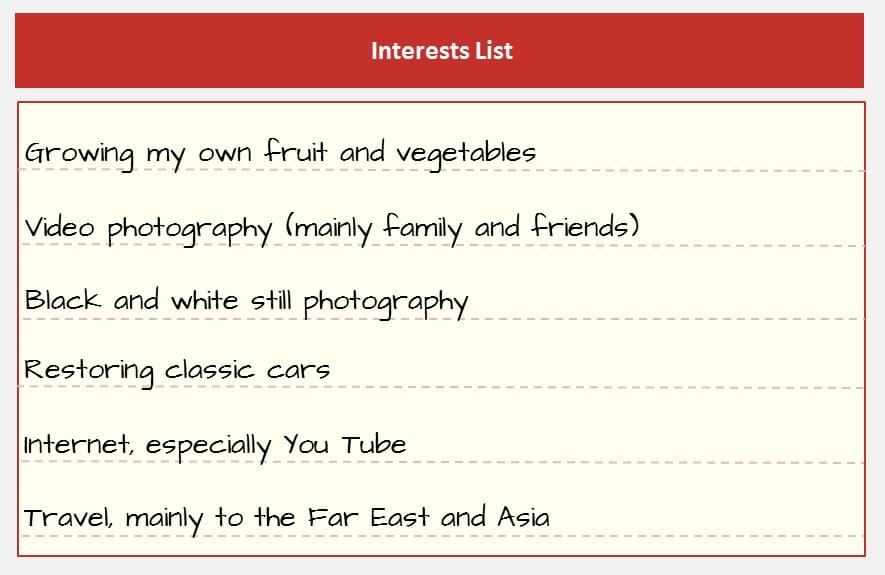
Prioritize What’s Important to You
You’ll have two separate lists, one for your skills and one for your interests. Chances are you’ve got quite a few entries on each list, which is why this step is important — you’re going to prioritize them, so when you start combining skills and interests, you’re not looking at thousands of ideas!
Go through your lists and look at each item.
- Prioritize each one based on your experience, expertise, interest and enthusiasm for it. Since we’re going to be using these skills and interests to build business ideas, we’ll want to focus on the topics and areas you care about.
- Rate each item as High, Medium or Low, spending on how you’d feel about developing it into a business idea. Just write H, M or L next to each item.
- Take your time over this section, it’s important you’re satisfied with how you’ve prioritized everything.
Combine Skills & Interests to Create Business Ideas
This is where things get interesting. What you’re going to do now is combine your skills and interests to create some interesting ideas that you might be able to develop into a business. Now, some of these combinations could be completely ridiculous, some could be strange, and others, well, they could have… potential.
- Take the first skill that you have rated as ‘H’ and put it with the first interest that you’ve rated as ‘H’. Write down the combination.
- Combine that first skill with the second interest you rated as H and so on until you’ve combined your first skill with all ‘H’ interests.
- Next, go to your second ‘H’ skill and combine it with all ‘H’ interests and so on until you’ve combined all of your ‘H’ skills with all of your ‘H’ interests.
- If, after completing this step, you don’t feel that you have quite enough combinations, you can repeat this with your ‘M’ skills and interests.
- By the time you’ve finished, you should have a reasonable list of combined skills and interests that you can develop into a business idea.
You can see how this would work below.
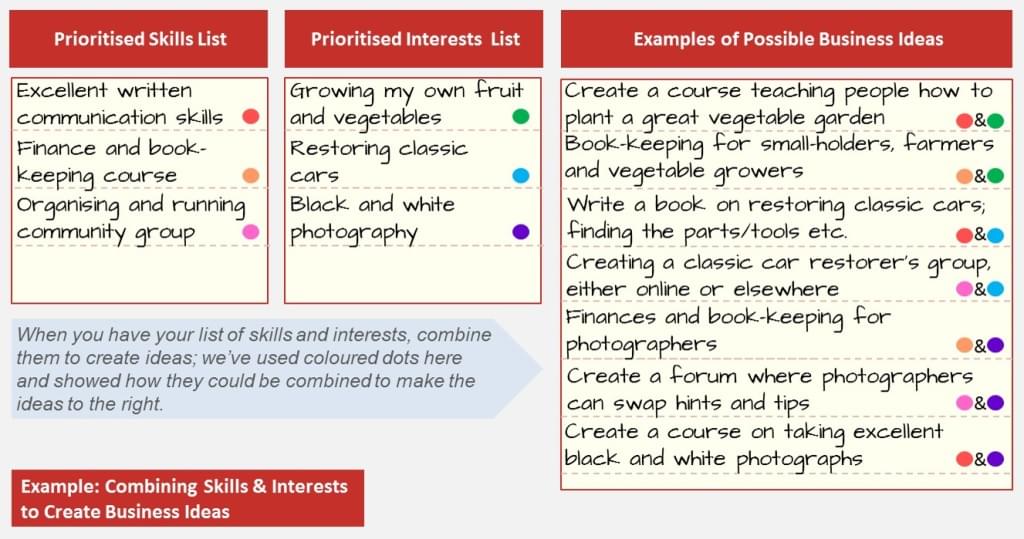
Create a Shortlist of Ideas
You’ll now have a long list of business ideas — some that are objectively terrible, a number that are mediocre, and possibly a few that could become something. Go through your ideas and delete any that are completely impractical, ridiculous, too complicated, too expensive, or that you don’t like the look of. Don’t be afraid to be ruthless!
Hopefully, you’ll still have a few left. Go through each and ask yourself if it’s something you could develop:
- Does the idea excite you?
- Do you understand enough of what the idea might need to bring it to fruition?
- Do you think there’s a market for a product or service based on the idea?
- Is this something you could see yourself doing for the next year or ten?
- Do you think people would pay for a product or service based on the idea?
If you answer yes to all those questions, you’ve got something you can explore further. Create a shortlist of any ideas you think are worth investigating.
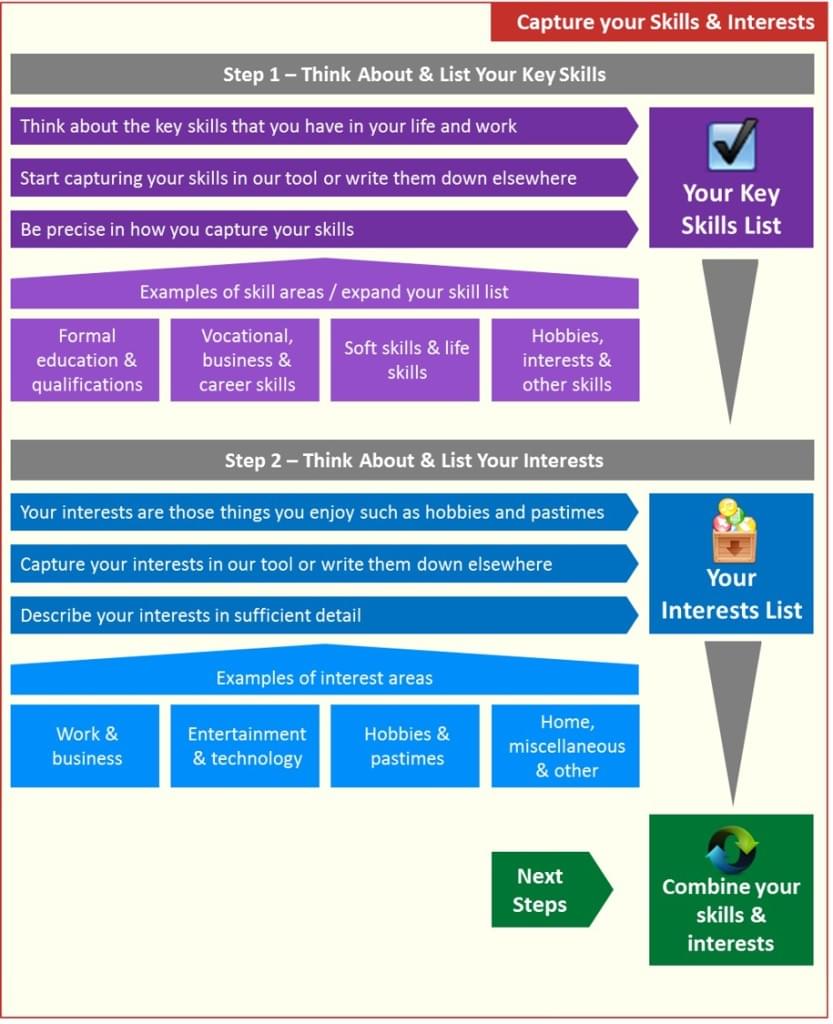
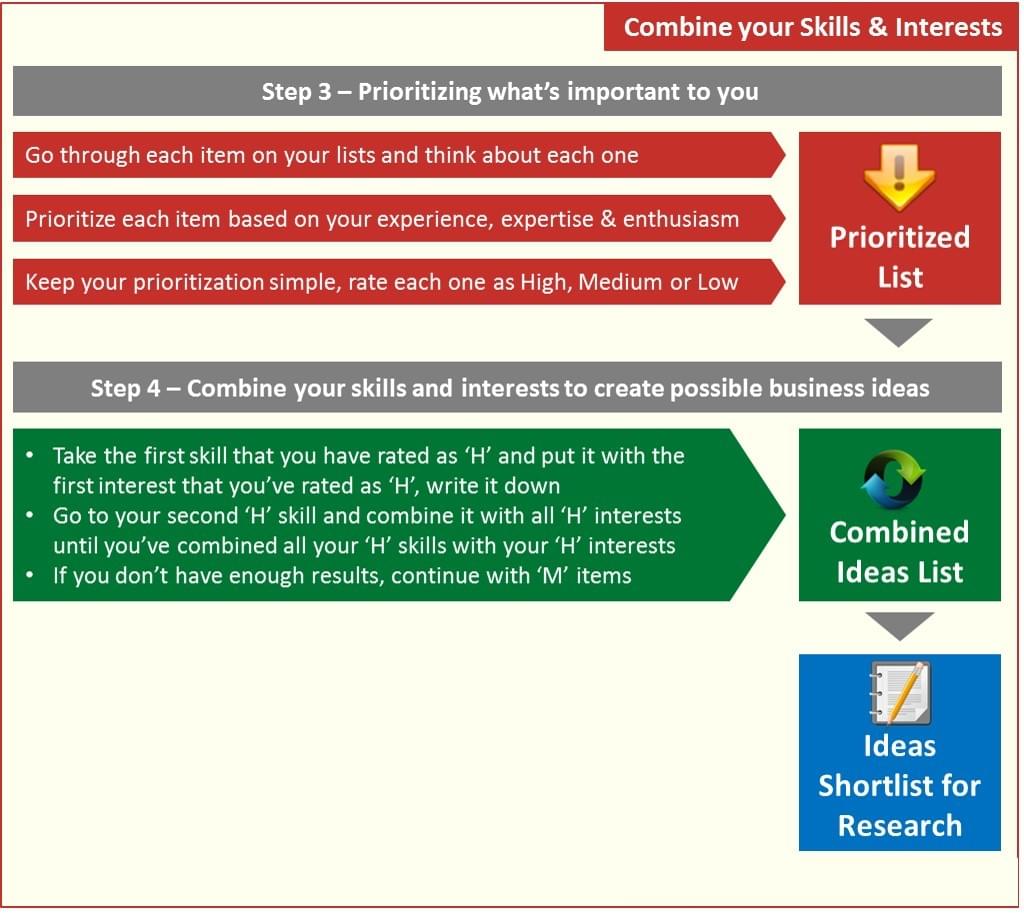
Next Steps
Once you’ve got your shortlist, you’ll want to complete some market research and validate your ideas. Testing and validating ideas is critically important and shouldn’t be rushed. Here are some good starting points to test and validate ideas, products, and services.
I’ll finish with another secret about entrepreneurs — it’s not really about the ideas, it’s about the execution. One mediocre idea, well-executed, is better than a thousand awesome ideas you do nothing with. So, generate your ideas, find something you’re passionate about, and, most importantly, Go Do It!
Frequently Asked Questions (FAQs) About Uncovering Your Next Great Business Idea
How can I identify a profitable business idea?
Identifying a profitable business idea involves a combination of market research, understanding your skills and passions, and identifying gaps in the market. Start by looking at industries that interest you and identify any problems or needs that are not being met. Then, consider how your skills and knowledge can be used to solve these problems or meet these needs. It’s also important to consider the potential profitability of your idea by looking at factors such as the size of the market, competition, and potential costs.
What are some low-investment business ideas?
There are many low-investment business ideas that you can consider. These include starting a dropshipping business, becoming a freelance writer or graphic designer, starting a blog or YouTube channel, or offering consulting services in a field you are knowledgeable in. The key is to find something that you are passionate about and that has a market demand.
How can I validate my business idea?
Validating your business idea involves conducting market research to ensure there is a demand for your product or service. This can involve conducting surveys, interviewing potential customers, or using online tools to analyze market trends and competition. It’s also important to test your product or service on a small scale before fully launching your business.
What are some examples of successful business ideas?
There are countless examples of successful business ideas across various industries. These include innovative tech startups like Uber and Airbnb, online businesses like Amazon and Shopify, and service-based businesses like cleaning services or personal training. The key to success is finding a unique idea that meets a market need and executing it well.
How can I come up with a unique business idea?
Coming up with a unique business idea involves thinking creatively and looking for gaps in the market. Start by identifying problems that need solving or needs that are not being met in your chosen industry. Then, think about how you can solve these problems or meet these needs in a way that is different from existing solutions.
How can I turn my passion into a business?
Turning your passion into a business involves identifying how your passion can meet a market need. This could involve teaching others about your passion through online courses or workshops, creating products related to your passion, or offering services in your area of expertise.
What are some common challenges when starting a business?
Some common challenges when starting a business include finding startup capital, identifying a profitable business idea, conducting market research, creating a business plan, and navigating legal requirements. It’s important to be prepared for these challenges and to seek advice and support when needed.
How can I fund my business idea?
There are several ways to fund your business idea, including personal savings, loans, grants, crowdfunding, or seeking investment from venture capitalists or angel investors. The best option will depend on your specific circumstances and the nature of your business idea.
How can I protect my business idea?
Protecting your business idea can involve a combination of legal measures such as patents, trademarks, and copyrights, as well as practical measures such as keeping your idea confidential until it is fully developed and launched.
How can I develop a business plan for my idea?
Developing a business plan involves outlining your business idea, conducting market research, defining your target audience, setting business goals, outlining your marketing and sales strategy, and detailing your financial projections. There are many resources available online to guide you through this process.
 Paul Maplesden
Paul MaplesdenPaul Maplesden is a freelance writer specializing in business, finance, and technology. He loves Earl Grey tea, pivot tables, hats, and other fine geekery.





